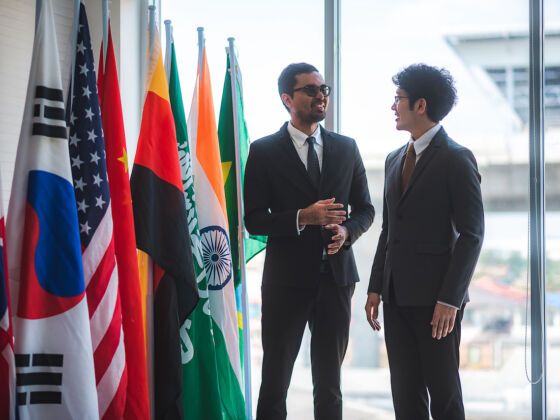BUT WHEN YOU’RE thinking of jobs that allow for a lifetime of travel, it’s a tough one to ignore. And as it turns out, the reality is both less glamorous and, perhaps, more in keeping with your goals and principles than you’d expect.

I recently asked Doug Holland (my dad), who is currently serving as a Canadian Foreign Service Officer in Barbados, what life in the diplomatic corps is really like. Read on to see if you have what it takes – and if the job’s for you.
What does a diplomat really do, anyway?
Most countries’ diplomatic responsibilities are divided up into three main categories: political, trade, and consular services.
So, “a political officer, in a small mission like ours in Barbados, is a generalist who reports on local developments and advocates for support for Canadian interests,” such as a Canadian-supported motion at the United Nations or a similar multilateral international effort.
“A trade officer promotes the interests of Canadian companies, by introducing them to useful contacts, making them aware of commercial opportunities, providing guidance for visits and basic information they can use.”
A consular officer deals with day-to-day travel problems like lost passports, and in an emergency, “provides essential services to Canadians in need.”
On an average day, a political officer might write a speech for a visiting high-ranking politician from back home or attend a ribbon-cutting ceremony.
A trade officer might put an engineering firm from their home country in touch with a local government, to help them land a contract setting up the new light rail system.
A consular officer might have to sort out the case of a visiting national accused of a crime, or contact family members back home in the case of an injury or death.
There are also more specialized roles for development experts, police or military attachés, and more, but the bulk of the work falls into these three main categories.
What are the perks?
Salaries vary across different governments and across different roles, but a rough spectrum might run from $35 000 to $100 000 per year, not including upper management. Other benefits include extra vacation time, “family reunion” flights, subsidized (and sometimes flashy) accommodation, duty-free goods, and more.
And then of course, there’s the travel, which “can range from the mundane and limited to exotic and too frequent.” For example: since arriving in Barbados, “I’ve been to Antigua twice, Dominica twice, Grenada, St. Kitts, St. Lucia twice and St. Vincent, all within less than 5 months – but I’ve not seen much of any of them,” thanks to meetings and report-writing.
Still, living and working as a diplomat, contrary to stereotype, can lead to a great deal of knowledge and insight about a country. Between invitations to cultural events and celebrations, endless briefings about local customs, and the simple immersion of everyday life, “you can get to know things about a country that few others would.”
Can diplomats ‘make a difference’ in the world?
Diplomats go where the average traveler can’t, from full-on hot zones like Iraq and Afghanistan to (marginally) more stable, impoverished places like Haiti or Chad.
While most development and aid work is done by more specialized staff, diplomats in these areas nevertheless have the opportunity to help repair a fractured economy, spread the gospel of electoral accountability, or get involved in the refugee claims process.
Even in calmer areas, there are still ample opportunities to effect positive change: “I like to think I am making a difference by promoting Canadian training for police, military, etc. and by encouraging regional institutional development so the good guys can better compete with the organized criminals.
Or making a difference by fostering Canadian standards for government procurement that will reduce corruption and old boys’ influence/control.” In other areas, “a trade officer might say she makes a difference by increasing a company’s sales so it employs more people.”
And a consular officer makes a difference for at least one stressed-out traveler when they arrange a replacement passport quickly, or, in a worst-case scenario, “when they send the body bag home promptly.”
Sounds pretty sweet – what’s the catch?
Some of the big-picture downsides can include social, cultural and linguistic isolation, or even physical danger. And of course, moving around the world every three years or so can take a heavy toll on families, as spouses are forced to sacrifice their own careers and children hop from school to school.
On a day-to-day basis, there are also the inevitable expat frustrations, when “things don’t work they way they ‘should’ like in Canada.” Then there are the financial challenges in the pricier cities of the world, “where our salaries don’t match up to what the locals get, so you’re in this really interesting place but can’t afford to go to a restaurant.”
How do I sign up?
Competition is fierce for a relatively small number of positions: baseline requirements generally include a bachelor’s degree (though a masters is increasingly an ‘unofficial’ requirement), and tough-to-quantify characteristics like judgment and intelligence. Language skills are an asset, as is prior international experience.
Expect an extended testing process rather than a straightforward resume-and-cover-letter, interview-and-offer type of scenario. You might be tested on your writing skills, your knowledge of world events, logic, or aptitude for languages.
In the latter stages, expect to have to pass a serious security screening: this may include exams relating to your physical and mental health, extensive police background checks, and the accumulation of a fair bit of your personal information in a file folder somewhere in your government’s intelligence branch.
For more information, try the US Department of State, the British Foreign and Commonwealth Office, the Canadian Department of Foreign Affairs and International Trade, or the Australian Department of Foreign Affairs and Trade.
Eva Holland is a historical researcher and freelance writer living in Ottawa, Canada. She blogs about travel for World Hum and Vagablogging, and her writing has appeared in The Ottawa Citizen, The Edmonton Journal, and Matador Travel.